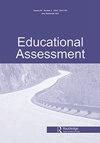低风险考试情境下的问题-行为效应研究:提高考生努力程度的廉价策略
IF 2.3
Q1 EDUCATION & EDUCATIONAL RESEARCH
引用次数: 0
摘要
本文章由计算机程序翻译,如有差异,请以英文原文为准。
Examining the Question-Behavior Effect in Low-Stakes Testing Contexts: A Cheap Strategy to Increase Examinee Effort
ABSTRACT Questioning individuals about future behavior influences the subsequent performance of that behavior. This question-behavior effect may be enhanced when questions include positive self-identity prompts. To evaluate the effectiveness of this intervention in a testing context, we randomly assigned examinees to one of three conditions prior to completing a low-stakes test: answering five questions regarding intended effort prior to the test, answering five questions regarding intended effort that referenced positive self-identity prior to the test, or a control condition. We then administered two multiple-choice tests and collected two measures of test-taking effort: self-reported effort and response time effort. Answering questions about effort prior to completing the tests resulted in higher self-reported effort and perceived test importance. Moreover, in the question conditions, significantly fewer examinees were identified to be filtered from the dataset due to low effort. The easy strategy of asking examinees to report their intended effort appears to increase test-taking effort.
求助全文
通过发布文献求助,成功后即可免费获取论文全文。
去求助
来源期刊

Educational Assessment
EDUCATION & EDUCATIONAL RESEARCH-
CiteScore
3.20
自引率
6.70%
发文量
24
期刊介绍:
Educational Assessment publishes original research and scholarship on the assessment of individuals, groups, and programs in educational settings. It includes theory, methodological approaches and empirical research in the appraisal of the learning and achievement of students and teachers, young children and adults, and novices and experts. The journal reports on current large-scale testing practices, discusses alternative approaches, presents scholarship on classroom assessment practices and includes assessment topics debated at the national level. It welcomes both conceptual and empirical pieces and encourages articles that provide a strong bridge between theory and/or empirical research and the implications for educational policy and/or practice.
 求助内容:
求助内容: 应助结果提醒方式:
应助结果提醒方式:


